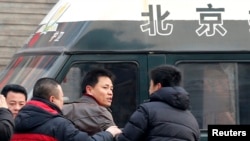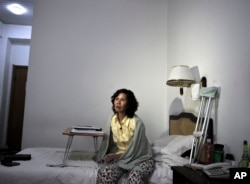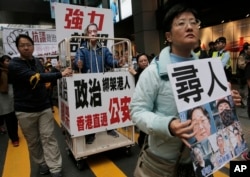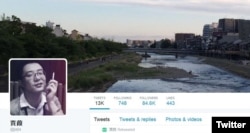As China's influence grows and the world looks to Beijing to play a constructive role as an international stakeholder, its growing resolve to silence its critics at home and abroad is raising concerns. And instead of achieving the apparent goal of silencing its critics, China’s actions are fueling a backlash, rights advocates said.
A top congressional body on China has urged President Barack Obama to make human rights a priority when he meets Thursday with Chinese leader Xi Jinping on the sidelines of the Nuclear Security Summit in Washington D.C.
Pillars crumbling
In a letter to President Obama, U.S. Representative Christopher Smith and Senator Marco Rubio, co-chairmen of the Congressional Executive Commission on China, even suggested that Xi not be allowed to visit the capital again “without any accounting for the severe erosion of human rights and rule of law which has taken place on his watch and with his authorization.”
They also said there is a growing consensus that the pillars of U.S.-China policy are crumbling.
“Trade, investment, and people-to-people exchanges have not brought political reforms or ensured human rights or made China a 'responsible stakeholder' in the international system,” they said in the letter. “Rather, Beijing seems emboldened in its repression both at home and abroad.”
China has long had little tolerance for dissent. But since Xi Jinping came to power three years ago, the space for civil engagement and criticism has shrunk dramatically. And increasingly, authorities appear to be looking to silence criticisms overseas as well, especially commentaries in Chinese.
At home and abroad
There has also been a growing number of detentions of lawyers, journalists and activists.
The more recent and mysterious disappearance of booksellers in Hong Kong, including the apparent kidnapping of British citizen Lee Bo and Swedish citizen Gui Minhai, highlights China’s growing determination.
Gui was paraded on state television, where he delivered an apparently forced confession to a decade-old drunk driving case. This, after he mysteriously vanished from his beach apartment in Thailand.
After being held in China for more than two months, Lee Bo returned to Hong Kong last week and has said he will never run a bookstore again or sell books that are a “sheer fabrication.”
Authorities reacted even more dramatically following the release of an anonymous open letter on a state-controlled Wesbite that called for Xi Jinping’s resignation. The open letter was released around the time Chinese officials were holding high-level meetings in Beijing at the beginning of March. Analysts said the nature of the letter and how it could highlight an ongoing internal power struggle at the highest levels of the party were a key reason for the sharp response.
While the letter was quickly removed, at least 20 Chinese citizens have since disappeared, according to the pro-democracy website China Change. Prominent columnist Jia Jia was detained earlier this month as he tried to board a flight from Beijing to Hong Kong, also on suspicions of his involvement with the letter, but was later released.
Family members detained
Family members of two well-known foreign-based Chinese columnists who commented on the letter have also been taken into custody. Both deny any involvement in the publication of the letter.
New York-based Chinese activist Wen Yunchao has said that his parents and younger brother were taken away from their home in Guangdong last week. Chang Ping, a Chinese journalist who is now based in Germany said his direct family members and numerous relatives have been subject to investigation, harassment and threats after he published an article for Duetsche Welle about Jia Jia’s disappearance.
In a statement that he shared with VOA, Chang said that while all of his family members have been released, his father and brother are still not free because they were released on bail. He said that he has learned that after their release, they were taken back to the police station and forced to accept interviews with journalists and make fabricated statements.
Chang said that he refuses to accept authorities’ attempts to use kidnapping and extortion to force him to discontinue his work, which he said he has every right to do and will continue to do so.
Narrative control
As the world’s second largest economy, and an increasingly powerful international player, China's actions only highlight its weakness and inability to control the narrative, said William Nee, a China researcher at Amnesty International.
“There is a vibrant online community and commentary community outside of China that they cannot control and it seems that this is an effort to assert control over the people or media organizations that they don’t actually have control over," Nee said.
“But in a globalized society with free Internet and hundreds of millions of Chinese traveling abroad, that’s going to be increasingly hard to do.”
Crackdown backfires
China’s tough response to the letter and use of family members is not necessarily new, but by going after Jia Jia, a well connected journalist both at home and abroad, as well Chang Ping and Wen Yunchao, authorities have only raised more interest in the letter.
Nee said the letter, which was taken down shortly after it was put up, could have been handled more discretely.
The authorities' actions are really baffling and backfiring, he said.
“Now everybody in the commentary world, everybody that looks at China is reading the letter, taking it seriously, investigating it and playing a parlor game, (asking) who wrote it?”















